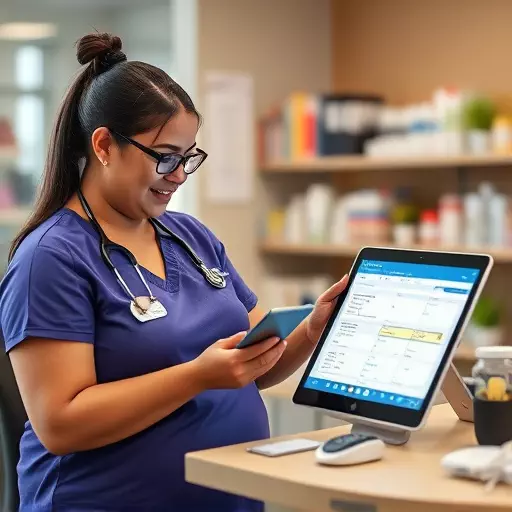In Ann Arbor, GLP-1 medications are a powerful tool against obesity, aiding weight loss through insulin stimulation and appetite reduction. Digital prescription management systems revolutionize traditional practices by efficiently tracking patient prescriptions, monitoring adherence, and remotely assessing outcomes. These systems offer benefits like accurate dosing, timely refills, real-time updates, and alerts, improving treatment adherence and potentially enhancing health outcomes for GLP-1 therapy in urban areas like Ann Arbor. Online platforms tailor GLP-1 care with features like medication history access, automated reminders, prescription updates, and communication, empowering patients and healthcare providers alike. The adoption of these digital systems transforms obesity care, streamlining processes, reducing errors, and promoting cost savings while optimizing treatment outcomes. Future trends include tailored digital management for remote areas and sophisticated tracking systems using real-time data to evaluate treatment effectiveness.
In the realm of obesity care, GLP-1 medications have emerged as a powerful tool, but managing these prescriptions can present challenges. Traditional methods often involve cumbersome paperwork and frequent patient-provider coordination. Enter digital prescription management systems, revolutionizing how Ann Arbor residents access and track their GLP-1 therapies. This article explores online solutions tailored for GLP-1 users, delving into the benefits of streamlined digital prescription tracking, understanding GLP-1 medications’ role, and envisioning the future of enhanced obesity care through technology.
- Understanding GLP-1 Medications and Their Role in Obesity Care
- The Challenges of Traditional Prescription Management for GLP-1 Users
- Digital Solutions: Revolutionizing Prescription Tracking for GLP-1 Therapies
- Features and Benefits of Online Prescription Management Systems
- Implementation and User Experience: A Look at Existing Platforms
- Future Trends and Considerations for Enhanced GLP-1 Care Through Technology
Understanding GLP-1 Medications and Their Role in Obesity Care

GLP-1 (Glucagon-like peptide-1) medications have emerged as powerful tools in the fight against obesity, offering a novel approach to weight management. These drugs mimic the natural hormone GLP-1, which is produced by the gut in response to food intake. By activating specific receptors, GLP-1 medications stimulate insulin secretion, enhance satiety feelings, and reduce appetite, making them valuable assets in obesity care. In Ann Arbor or anywhere else, digital prescription management systems for obesity care are transforming how healthcare providers prescribe and monitor these therapies.
With their unique mechanisms of action, GLP-1 drugs can lead to significant weight loss when used as part of a comprehensive treatment plan. However, proper monitoring is essential due to potential side effects. Digital prescription tracking systems enable healthcare professionals to efficiently manage patient prescriptions, track medication adherence, and remotely assess treatment outcomes. This technology plays a crucial role in optimizing GLP-1 therapy, ensuring patients receive the best possible care while leveraging the benefits of digital health solutions for enhanced obesity management.
The Challenges of Traditional Prescription Management for GLP-1 Users

Managing prescriptions for GLP-1 (Glucagon-Like Peptide-1) users can be a complex and challenging process, especially when compared to modern digital solutions. Traditional methods often involve manual tracking, where patients or their caregivers keep records of medication timings, dosages, and refills. This approach can lead to errors due to human oversight, particularly for those with busy lifestyles or multiple prescriptions. In the context of GLP-1 in Ann Arbor or any urban area, where obesity care is a significant concern, efficient prescription management is crucial.
Digital prescription management systems offer a revolutionary alternative. These platforms allow healthcare providers to electronically prescribe and track GLP-1 medications, ensuring accurate dosing and timely refills. For GLP-1 medication tracking systems, digital tools provide real-time updates, alerts for upcoming refill deadlines, and automatic notifications when a patient’s prescription is renewed. This streamlined process benefits both patients and medical professionals by improving adherence to treatment plans, enhancing overall obesity care, and potentially leading to better health outcomes.
Digital Solutions: Revolutionizing Prescription Tracking for GLP-1 Therapies

In the digital age, online prescription solutions are transforming the way GLP-1 therapies are managed for patients in Ann Arbor and beyond. Digital prescription management systems offer a streamlined approach to obesity care, especially for individuals on long-term GLP-1 medication regimens. These innovative tools enable doctors to issue prescriptions remotely, eliminating the need for patients to visit the clinic for refills.
With real-time tracking capabilities, these GLP-1 medication tracking systems ensure that patients receive timely reminders for their injections and refills. This technology enhances patient adherence to treatment plans by providing easy access to prescription history, dosage information, and expiration dates. By empowering patients with control over their medications, digital solutions contribute to more effective weight management and improved overall health outcomes.
Features and Benefits of Online Prescription Management Systems

Online Prescription Management Systems designed for GLP-1 users offer a host of features and benefits that significantly enhance obesity care. These digital platforms allow patients to manage their medications, track GLP-1 medication schedules, and receive automated reminders, ensuring adherence to treatment plans. By providing easy access to prescription updates, refills, and physician communication, these systems empower individuals in Ann Arbor and beyond to actively participate in their healthcare journey.
Moreover, such systems streamline the process for healthcare providers by facilitating efficient tracking of GLP-1 prescriptions, monitoring patient progress, and identifying potential issues early on. This not only improves treatment outcomes but also promotes cost savings through reduced prescription errors and optimized medication management, making digital prescription management a game-changer in obesity care.
Implementation and User Experience: A Look at Existing Platforms

The implementation of digital prescription management systems for GLP-1 (Glucagon-like peptide-1) users in Ann Arbor and beyond is gaining traction, offering a promising solution to enhance obesity care. These platforms provide an efficient way to track and manage GLP-1 medication, ensuring patients adhere to their treatment plans. By digitizing the prescription process, healthcare providers can easily monitor patient progress, adjust dosages, and send electronic prescriptions directly to pharmacies. This streamlines the entire experience for both medical professionals and patients, eliminating the need for traditional paper prescriptions and reducing potential errors.
Existing platforms cater to diverse user needs, from simple medication reminder apps to comprehensive GLP-1 management systems. Users can access their prescription history, set reminders for doses, and receive educational materials about their condition and medications. Some advanced systems even offer personalized insights and recommendations based on patient data, fostering a more proactive approach to obesity treatment. This digital transformation in GLP-1 care promises improved patient engagement and outcomes.
Future Trends and Considerations for Enhanced GLP-1 Care Through Technology

The future of GLP-1 (Glucagon-Like Peptide-1) care lies in the seamless integration of technology, aiming to enhance patient outcomes and simplify treatment management. One prominent trend is the evolution of digital prescription management systems tailored for obesity care. These innovative platforms enable healthcare providers to electronically prescribe GLP-1 medications, offering greater convenience and accessibility for patients, especially those in remote areas or with limited mobility. By digitizing this process, caregivers can monitor medication adherence and adjust dosages remotely, fostering a more proactive approach to GLP-1 therapy.
Furthermore, the development of sophisticated GLP-1 medication tracking systems is set to revolutionize patient care. These systems leverage technology to provide real-time data on medication intake, allowing for precise evaluations of treatment effectiveness and potential side effects. Such advancements have the potential to optimize GLP-1 therapy protocols in Ann Arbor and beyond, improving weight management outcomes and ensuring patients receive personalized, technology-driven care.
